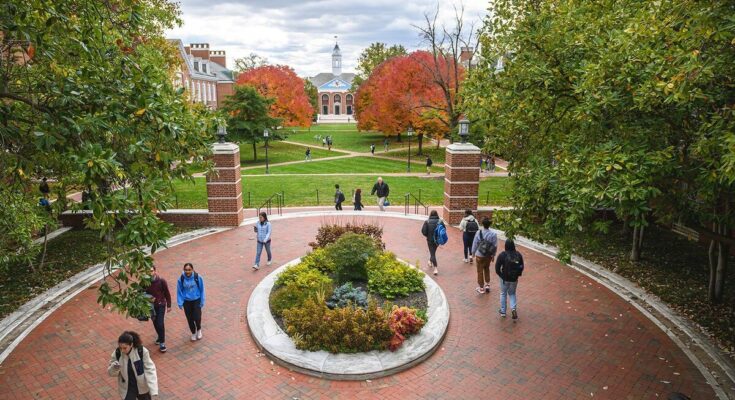Johns Hopkins University (JHU), located in Baltimore, Maryland, is renowned for its research excellence, innovative programs, and contributions to public health and medicine. Here is an overview of Johns Hopkins University, covering its history, academic programs, research initiatives, campus life, and notable achievements:
Overview
History
- Founded: 1876, named after its benefactor, Johns Hopkins, a Quaker entrepreneur and philanthropist.
- Mission: Dedicated to education, research, and the advancement of human knowledge and society.
Campus
- Location: The main campus is in Baltimore, Maryland, with additional campuses for the schools of medicine, public health, and nursing in East Baltimore, and facilities in Washington, D.C., Bologna, Italy, and Nanjing, China.
- Architecture: The Homewood campus features Georgian-style architecture and offers state-of-the-art facilities for research, teaching, and student life.
Academic Programs
- Schools:
- Krieger School of Arts and Sciences
- Whiting School of Engineering
- School of Education
- Carey Business School
- School of Advanced International Studies (SAIS)
- School of Medicine
- Bloomberg School of Public Health
- School of Nursing
- Peabody Institute (Conservatory of Music)
- Undergraduate Programs: Offers a broad range of majors and minors with a strong emphasis on interdisciplinary studies.
- Graduate Programs: Provides advanced degrees across various disciplines, including master’s, doctoral, and professional degrees.
Research Initiatives
- Pioneering Research: Known for significant contributions in fields like medicine, public health, engineering, and international studies.
- Interdisciplinary Centers and Institutes: Includes the Applied Physics Laboratory (APL), the Berman Institute of Bioethics, and the Institute for NanoBioTechnology.
- COVID-19 Response: The Johns Hopkins Coronavirus Resource Center became a crucial resource for global COVID-19 data and research.
Student Life
- Diverse Community: Enrolls over 24,000 students from all 50 states and more than 120 countries.
- Student Organizations: Hosts over 400 student groups, including academic, cultural, recreational, and service-oriented organizations.
- Athletics: Competes in the NCAA Division III Centennial Conference, with strong programs in sports like lacrosse, swimming, and track and field.
Notable Achievements
- Nobel Laureates: Affiliates include numerous Nobel Prize winners in various fields.
- Alumni: Graduates have become influential leaders, including Michael Bloomberg (former Mayor of New York City), Woodrow Wilson (28th U.S. President), and Madeleine Albright (former U.S. Secretary of State).
- Medical Innovations: Pioneering work in various medical fields, including cardiology, neurosurgery, and public health.
Key Focus Areas
Medicine and Public Health
- Johns Hopkins Hospital: Consistently ranked among the top hospitals in the United States.
- Bloomberg School of Public Health: The oldest and largest public health school in the world, known for its research and influence on public health policy.
Engineering and Technology
- Whiting School of Engineering: Renowned for research in areas like biomedical engineering, materials science, and computer science.
- Applied Physics Laboratory: Conducts research and development for national security and space exploration.
International Studies
- SAIS: Offers programs in international relations, economics, and policy, with campuses in Washington, D.C., Bologna, and Nanjing.
Conclusion
Johns Hopkins University stands out as a leader in higher education and research, with a profound impact on medicine, public health, science, and technology. Its commitment to innovation, interdisciplinary collaboration, and global engagement continues to drive advancements and address some of the world’s most pressing challenges



